Comprehensive Guide to Garden Maintenance in Enfield
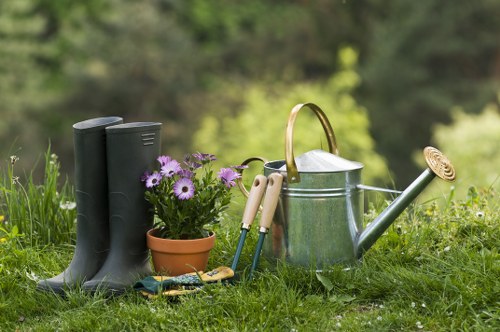
Introduction to Garden Maintenance
Maintaining a beautiful garden in Enfield requires dedication, knowledge, and the right techniques. Whether you are a seasoned gardener or a novice, understanding the fundamentals of garden maintenance can transform your outdoor space into a lush, vibrant oasis. This guide explores essential tips and strategies to keep your garden thriving throughout the year.
Garden maintenance involves a variety of tasks, including planting, pruning, weeding, and pest control. Each of these activities plays a crucial role in ensuring the health and beauty of your plants. In Enfield, where the climate can vary, it's important to tailor your maintenance practices to suit the local conditions.
By implementing effective garden maintenance practices, you can enhance the curb appeal of your home, create a peaceful retreat, and even grow your own fruits and vegetables. Let's delve into the key aspects of garden maintenance in Enfield.
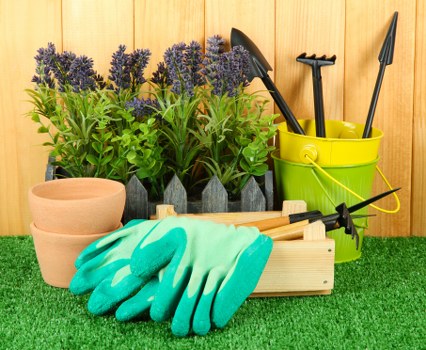
Seasonal Garden Maintenance
Spring Maintenance
Spring is a critical time for garden maintenance in Enfield. As the weather warms up, plants begin to awaken from their winter dormancy. Start by clearing any debris, such as fallen leaves and branches, to prepare the garden for new growth. This is also the time to plant spring bulbs, vegetables, and annuals that thrive in cooler temperatures.
Pruning is essential in spring to remove dead or diseased branches, allowing for healthier growth. Additionally, scheduling a thorough soil test can help you understand the nutrient needs of your garden, ensuring that your plants receive the right balance of fertilizers.
Mulching is another important spring task. Applying a layer of mulch helps retain soil moisture, suppress weeds, and regulate soil temperature. Organic mulches, such as compost or bark, also enrich the soil as they break down.
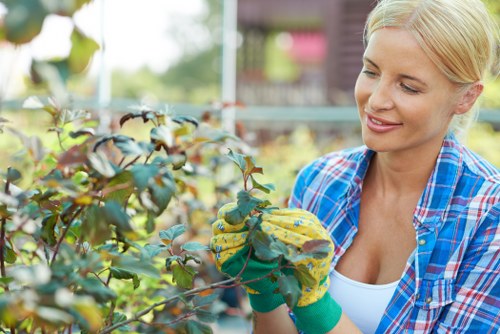
Summer Maintenance
Summer brings intense sunlight and heat, making it essential to focus on irrigation and pest control. Ensure that your garden receives adequate water by setting up a consistent watering schedule. Early morning or late evening watering is ideal to minimize evaporation and provide plants with the moisture they need to thrive.
Regular weeding is crucial during the summer to prevent unwanted plants from competing with your garden's vegetation. Consider using organic weed control methods to maintain a healthy ecosystem.
Pruning should continue in the summer to shape plants and promote airflow, reducing the risk of disease. Additionally, keep an eye out for pests and take immediate action if you notice any infestations to protect your plants.
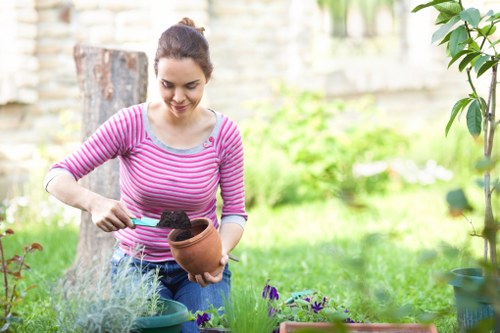
Autumn Maintenance
Autumn is a time to prepare your garden for the colder months ahead. Begin by harvesting any remaining fruits and vegetables, and clear out spent plants to reduce the chances of pests overwintering in your garden.
Raking leaves and composting them is an excellent way to recycle nutrients back into the soil. This organic matter can be used to enrich garden beds in the spring.
It's also important to plant cover crops in the fall to improve soil structure and fertility. Cover crops like clover or rye help prevent soil erosion and add valuable nutrients to the ground.
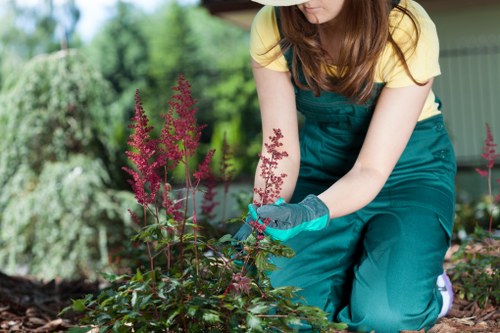
Winter Maintenance
During winter, garden maintenance focuses on protecting plants from frost and harsh weather conditions. Mulching garden beds provides insulation, safeguarding roots from freezing temperatures.
Pruning should be minimal in winter, only removing any dead or damaged branches. This helps plants conserve energy and prepare for new growth in the spring.
Planning for the upcoming gardening season is also essential. Take this time to research new plants, design garden layouts, and order seeds or plants in advance to ensure you are ready to start fresh when spring arrives.
Essential Tools for Garden Maintenance

Having the right tools can make garden maintenance tasks easier and more efficient. Here are some essential tools every gardener in Enfield should have:
- Pruning Shears: Ideal for trimming and shaping plants.
- Garden Fork: Useful for turning soil and aerating garden beds.
- Watering Can or Hose: Essential for keeping plants hydrated.
- Weeder: Helps in removing unwanted weeds without disturbing the surrounding plants.
- Gloves: Protect your hands from thorns, dirt, and pests.
Investing in high-quality tools ensures durability and effectiveness, making your garden maintenance tasks less time-consuming.

Choosing the Right Plants for Enfield Gardens
Climate Considerations
Enfield's climate plays a significant role in determining which plants will thrive in your garden. With its temperate climate, Enfield experiences warm summers and mild winters, making it suitable for a wide variety of plants.
Select plants that are well-suited to your specific microclimate within Enfield. Factors such as sunlight exposure, soil type, and moisture levels should influence your plant choices.
Native plants are an excellent option as they are adapted to the local environment and require less maintenance. They also support local wildlife, contributing to a healthy ecosystem.

Perennials vs. Annuals
When planning your garden, consider a mix of perennials and annuals. Perennials, such as roses and lavender, come back year after year, reducing the need for replanting. They provide a stable foundation for your garden's structure.
Annuals, like marigolds and petunias, offer vibrant, seasonal color and can be changed each year to keep your garden fresh and exciting.
Incorporating both types of plants ensures continuous blooming and a dynamic garden landscape throughout the seasons.

Vegetable Gardening in Enfield
Growing your own vegetables can be rewarding and sustainable. Enfield's climate is conducive to a variety of vegetables, including tomatoes, cucumbers, and leafy greens.
Start by selecting a sunny location with well-drained soil. Implement crop rotation to maintain soil fertility and reduce the risk of pests and diseases.
Regular watering and proper fertilization are key to a productive vegetable garden. Consider using organic fertilizers to promote healthy plant growth.

Pest and Disease Management
Identifying Common Pests
Pests can quickly damage your garden if not managed effectively. Common pests in Enfield include aphids, slugs, and caterpillars.
Regularly inspect your plants for signs of pest infestation, such as chewed leaves or sticky residues. Early detection allows for easier and more effective control.
Encourage natural predators, like ladybugs and birds, to help keep pest populations in check. Installing birdhouses or creating habitats can attract these beneficial creatures.
Natural Pest Control Methods
Opting for natural pest control methods is both environmentally friendly and safe for your plants. Here are some effective strategies:
- Neem Oil: A natural pesticide that disrupts the life cycle of pests.
- Insecticidal Soaps: Effective against soft-bodied insects like aphids.
- Companion Planting: Planting certain plants together can repel pests. For example, planting basil near tomatoes deters tomato hornworms.
- Physical Barriers: Using nets or row covers to protect plants from insects.
Implementing these methods helps maintain a healthy garden without relying on harmful chemicals.

Managing Plant Diseases
Plant diseases can severely impact the health of your garden. Common diseases in Enfield include powdery mildew, blight, and root rot.
Preventing diseases starts with selecting disease-resistant plant varieties and ensuring proper spacing to promote good air circulation.
Regularly remove and dispose of infected plant material to prevent the spread of diseases. Additionally, practicing crop rotation and maintaining healthy soil can reduce the incidence of plant diseases.

Soil Health and Fertility
Soil Testing and Preparation
Healthy soil is the foundation of a thriving garden. Conducting a soil test in Enfield helps you determine the pH levels and nutrient content of your soil.
Based on the soil test results, amend your soil with necessary nutrients. Adding organic matter, such as compost or aged manure, improves soil structure and fertility.
Ensuring proper drainage is also crucial. If your soil tends to retain water, consider incorporating sand or perlite to enhance drainage.

Composting for a Sustainable Garden
Composting is an excellent way to recycle kitchen scraps and garden waste into nutrient-rich soil. In Enfield, you can easily set up a composting system in your backyard.
Start by collecting organic materials like vegetable peelings, grass clippings, and fallen leaves. Create a balanced mix of green and brown materials to promote efficient decomposition.
Turn the compost regularly to aerate it and accelerate the composting process. In a few months, you'll have high-quality compost to enrich your garden soil.

Mulching for Moisture Retention
Mulching is a vital practice in garden maintenance that offers multiple benefits. In Enfield, where summers can be hot, mulching helps retain soil moisture, reducing the need for frequent watering.
Apply a 2-3 inch layer of mulch around your plants, ensuring not to pile it against the plant stems. Organic mulches, such as straw, wood chips, or shredded leaves, also break down over time, adding nutrients to the soil.
Mulching suppresses weed growth, minimizing competition for resources and making garden maintenance easier.

Pruning and Trimming Techniques
Why Pruning is Important
Pruning is essential for maintaining the health and appearance of your garden plants. It helps remove dead or diseased branches, promotes better air circulation, and encourages new growth.
Regular pruning also shapes plants, ensuring they grow in a balanced and aesthetically pleasing manner. Proper pruning techniques can extend the lifespan of your plants and enhance their productivity.
Different plants require different pruning methods, so it's important to understand the specific needs of each species in your garden.
Effective Trimming Strategies
When trimming your plants, always use sharp, clean tools to make precise cuts. This minimizes damage and reduces the risk of disease transmission.
Start by removing any dead or damaged branches. Next, thin out crowded areas to improve air circulation. For flowering plants, pruning after blooms have faded encourages new growth and future blooms.
For shrubs and hedges, regular trimming maintains their shape and prevents overgrowth. Be mindful of the specific growth habits of each plant to ensure effective pruning.

Tree Pruning Tips
Pruning trees requires careful planning to avoid harming their structure. Focus on removing any branches that cross or rub against each other, as this can cause damage over time.
Maintain a balanced canopy by cutting back overly long branches, promoting even growth. This not only improves the tree's appearance but also enhances its stability.
For large trees, consider consulting a professional arborist to ensure safe and effective pruning practices.

Watering Strategies for a Thriving Garden
Understanding Your Garden's Water Needs
Proper watering is crucial for garden maintenance in Enfield. Different plants have varying water requirements, so it's important to understand the specific needs of each species in your garden.
Factors such as soil type, sunlight exposure, and temperature influence how much water your plants need. For instance, sandy soils drain quickly and may require more frequent watering, while clay soils retain moisture longer.
Implementing a consistent watering schedule helps maintain optimal soil moisture levels, promoting healthy plant growth.

Efficient Irrigation Systems
Investing in an efficient irrigation system can save time and conserve water. Drip irrigation and soaker hoses are effective methods that deliver water directly to the plant roots, minimizing evaporation and runoff.
Automated watering systems with timers ensure your garden receives the right amount of water at the optimal times, reducing the manual effort required for watering.
Regularly check and maintain your irrigation system to prevent leaks and ensure even water distribution throughout your garden.

Drought-Resistant Plants
Selecting drought-resistant plants is a smart strategy for garden maintenance in areas with limited water availability. These plants are adapted to thrive with minimal watering, making them both sustainable and low-maintenance.
Examples of drought-resistant plants suitable for Enfield gardens include lavender, sedum, and ornamental grasses. These plants not only conserve water but also add texture and color to your garden landscape.
Incorporating drought-resistant varieties can reduce your garden's overall water consumption, contributing to environmental sustainability.

Lawn Care in Enfield
Maintaining a Healthy Lawn
A well-maintained lawn is a key component of garden maintenance in Enfield. Start by selecting a grass type that suits your climate and soil conditions. Popular choices include fescue, ryegrass, and Bermuda grass.
Mowing your lawn regularly keeps it looking neat and encourages robust growth. Ensure your mower blades are sharp to make clean cuts, reducing the risk of disease.
Fertilizing your lawn in the spring and fall provides essential nutrients, promoting healthy and green grass throughout the year.
Weed Control and Aeration
Controlling weeds is essential for a pristine lawn. Hand-pulling weeds or using selective herbicides can help manage unwanted plants without harming your grass.
Regular aeration improves soil compaction, allowing water, air, and nutrients to reach the grass roots more effectively. Aerate your lawn annually, especially if it experiences heavy foot traffic.
Overseeding after aeration fills in bare spots and enhances the density of your lawn, reducing the chances of weed invasion.

Lawn Irrigation and Watering Tips
Proper irrigation is vital for maintaining a lush lawn. Water deeply and infrequently to encourage deep root growth, making your grass more resilient to drought conditions.
Early morning watering minimizes evaporation and reduces the risk of fungal diseases. Avoid watering during the hottest parts of the day to ensure maximum absorption.
Adjust your watering schedule based on seasonal changes and rainfall patterns to maintain optimal lawn health.

Garden Lighting and Irrigation
Enhancing Your Garden with Lighting
Garden lighting adds beauty and functionality to your outdoor space. It allows you to enjoy your garden even after dark while highlighting key features such as pathways, plants, and decorative elements.
Solar-powered lights are an eco-friendly option that require minimal maintenance. Alternatively, consider LED lighting for energy efficiency and long-lasting performance.
Strategically placing lights can create ambiance and enhance the overall aesthetic of your garden, making it a welcoming space for evening gatherings.

Smart Irrigation Systems
Modern irrigation systems offer smart features that optimize water usage and reduce waste. These systems can be controlled remotely, allowing you to adjust watering schedules based on weather conditions.
Integrating sensors that monitor soil moisture levels ensures your garden receives the right amount of water, preventing overwatering and conserving resources.
Investing in a smart irrigation system not only enhances garden maintenance efficiency but also contributes to sustainable water management practices.

Garden Design and Layout
Planning Your Garden Layout
A well-designed garden layout enhances both the beauty and functionality of your outdoor space. Start by assessing the available space, sunlight exposure, and existing features to create a cohesive design plan.
Incorporate a mix of plant types, heights, and colors to add visual interest and depth to your garden. Consider the placement of pathways, seating areas, and focal points to create a balanced and inviting environment.
Utilize vertical gardening techniques, such as trellises and arches, to maximize space and add architectural elements to your garden.

Incorporating Hardscaping Elements
Hardscaping elements, such as patios, decks, and garden walls, complement the natural beauty of your garden. These structures provide functional spaces for relaxation and entertainment.
Choose materials that harmonize with your garden's overall aesthetic, whether it's natural stone, wood, or modern composites.
Integrating hardscaping with softscaping creates a seamless transition between different garden areas, enhancing the overall design and usability of your outdoor space.

Eco-Friendly Garden Practices
Sustainable Gardening Techniques
Embracing eco-friendly garden practices promotes sustainability and reduces your environmental footprint. Techniques such as composting, rainwater harvesting, and using organic fertilizers contribute to a healthier ecosystem.
Planting native species and creating habitats for beneficial insects support local biodiversity, making your garden a thriving habitat for wildlife.
Reducing the use of chemical pesticides and opting for natural alternatives ensures that your garden remains safe for both plants and animals.

Water Conservation Strategies
Water conservation is crucial, especially during dry spells. Implementing strategies like mulching, using drought-resistant plants, and installing efficient irrigation systems can significantly reduce water usage in your garden.
Collecting rainwater in barrels provides a sustainable water source for your plants, reducing reliance on municipal water supplies.
By adopting water-saving practices, you not only conserve this precious resource but also maintain a healthy and vibrant garden.

Professional Garden Maintenance Services
Benefits of Hiring Professionals
While DIY garden maintenance can be rewarding, hiring professional garden maintenance services in Enfield offers numerous benefits. Professionals bring expertise, experience, and specialized equipment to handle complex tasks efficiently.
They can provide tailored maintenance plans that address the specific needs of your garden, ensuring optimal plant health and aesthetic appeal.
Professional services also save you time and effort, allowing you to enjoy your garden without the stress of upkeep.

Choosing the Right Garden Maintenance Service
When selecting a garden maintenance service in Enfield, consider factors such as experience, reputation, and range of services offered. Look for companies that prioritize customer satisfaction and use sustainable practices.
Reading reviews and asking for recommendations can help you find a reliable and trustworthy service provider.
Ensure that the service you choose aligns with your garden's specific needs and your personal preferences, whether it's regular mowing, seasonal planting, or comprehensive garden care.

Conclusion
Effective garden maintenance in Enfield involves a combination of proper planning, regular care, and the right techniques. By understanding the unique aspects of your local climate and soil, selecting appropriate plants, and implementing sustainable practices, you can create a thriving and beautiful garden.
Whether you choose to maintain your garden independently or hire professional services, the key is consistency and attention to detail. A well-maintained garden not only enhances the beauty of your home but also provides a serene space for relaxation and enjoyment.
Start your garden maintenance journey today and transform your outdoor space into a flourishing haven in Enfield.
Contact us today to book your garden maintenance service and achieve the garden of your dreams!

